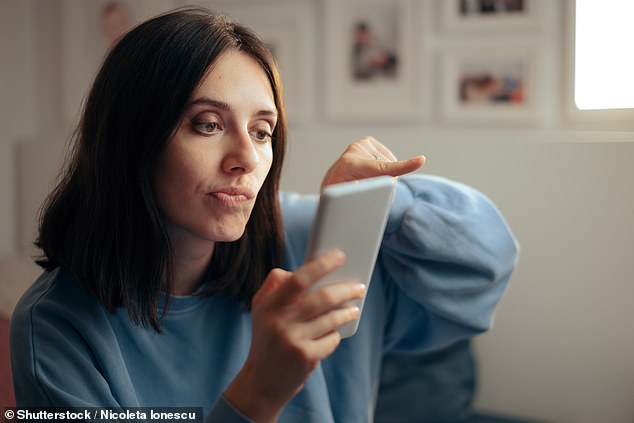When it comes to online dating, it may tempting to apply a beauty filter to bag yourself a date.
But be warned, ladies – as this can make you appear less intelligent, according to a study.
An online study involving more than 2,700 participants asked them to rate images of 462 individuals.
These images consisted of original faces and their corresponding ‘beautified’ versions.
None of the participants were told that some images had a beauty filter applied, and none were given ‘before’ and ‘after’ pictures of the same individual.
In a huge majority of cases – 96.1 per cent – people were rated more attractive with a beauty filter applied, as well as more trustworthy.
This was regardless of gender, age or race.
Women, however, were perceived by men as less intelligent after being ‘beautified’, the study showed.

When it comes to online dating, it’s tempting to apply a beauty filter to make sure you look your best. But be warned, ladies – as this can make you appear less intelligent, according to a study

An online study involving more than 2,700 participants asked them to rate images of 462 individuals. These images consisted of original faces (left) and their corresponding ‘beautified’ versions (right)

In a huge majority of cases – 96.1 per cent – people were rated more attractive with a beauty filter applied, as well as more trustworthy. This was regardless of gender, age or race
Writing in the journal Royal Society Open Science the researchers said: ‘Even though images of females were given higher scores of perceived attractiveness than images of males by both male and female raters, they were given lower scores of intelligence than images of males, particularly after beautification.
‘This finding suggests the existence of a gender bias in perceptions of intelligence.
‘Gender has also been found to play a significant role in the perception of related attributes such as competence and hireability.
‘These findings suggest that judgements made by male raters on attractiveness, intelligence and trustworthiness are more sensitive to the filters when compared with the judgements by female raters.’
The team, from the Ellis Alicante Foundation, said their results also support previously-reported examples of challenges faced by women in various spheres of life.
‘Given the prevalence in the use of beauty filters by young females – 90 per cent of women aged between 18 and 30 report using beauty filters before posting selfies on social media – our findings raise additional concerns about the potential negative impact.
‘Frequent use of beauty filters has already been found to lead to anxiety and depression, reduced self-esteem, body dysmorphia, an increase of plastic surgery, feelings of inadequacy and increased pressure to conform to unrealistic beauty standards.
‘Our research adds a new dimension to the harmful consequences of using beauty filters by empirically demonstrating that females are perceived by men as less intelligent after the application of the filters.’
This article was originally published by a www.dailymail.co.uk . Read the Original article here. .



